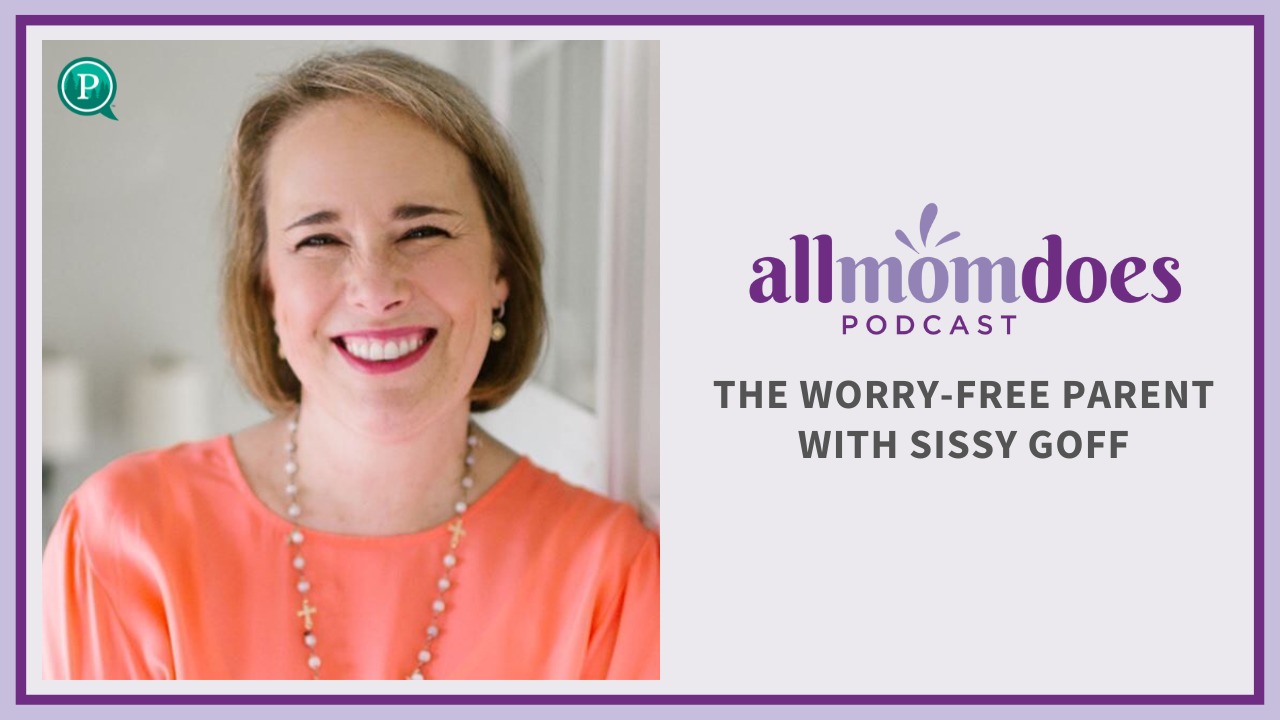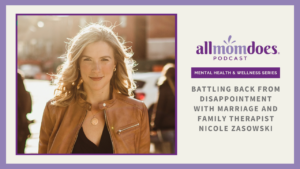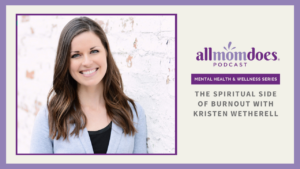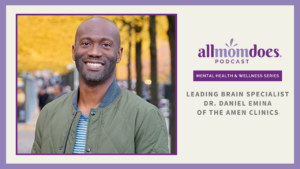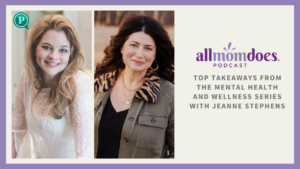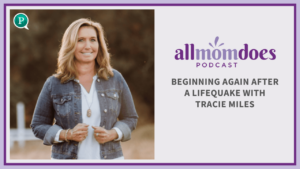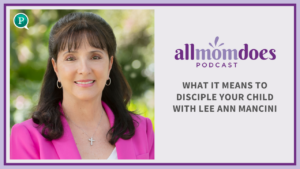Kids and being worried about them as a mom go together like peanut butter and jelly. But where is the line between a healthy care and protectiveness of our kids and what is unhealthy? Children and family therapist Sissy Goff joins The AllMomDoes Podcast host Julie Lyles Carr for great tools and insight into the anxiety loop and how to raise your kids in confidence.
Show Notes:
Find Sissy: Online | Instagram | Facebook | Podcast
Daystar Counseling: Online | Instagram | Facebook
Find Julie: Online | Instagram | Facebook | Twitter | Pinterest
AllMomDoes | Instagram | Facebook | Twitter
Transcription:
Julie Lyles Carr:
My brothers and my nieces and nephews have been calling me Sissy for years. And so now it’s my turn to be Sissy also for my new granddaughter. And maybe that’s part of my challenge in trying to get my head around the grandmother role is that we’re all calling me Sissy, which I’ve had that role for a while, but today’s guest has the same name, Sissy Goff. Welcome to the AllMomDoes podcast. I’m so glad you’re here.
Sissy Goff:
I’m so honored to get to be with you and especially to share a name with you. That is really fun.
Julie Lyles Carr:
We get to be name buddies. I really love it.
Sissy Goff:
Yes, me too, except I do have to say my little nephews are calling me Diddy.
Julie Lyles Carr:
Oh, okay. So you changed yours up.
Sissy Goff:
I’ve got a little variation. I did. Well, mostly because there are thousands of kids over the years who’ve called me Sissy and I wanted them to have a special name for me.
Julie Lyles Carr:
I like that.
Sissy Goff:
How that goes.
Julie Lyles Carr:
Well, and I say this with such confidence, right? Like, oh, and my granddaughter can call me Sissy. And we all know that she could choose to do something else and that’ll be my new name. But right now, today…
Sissy Goff:
You could be anything.
Julie Lyles Carr:
Today, it’s Sissy. And so we share a name today. So yeah, I love that.
Sissy Goff:
I love it.
Julie Lyles Carr:
Well, Sissy, I could not wait to have you on because you have such the CV, the different things that you have done, and I know for myself and for my listener, for you to be able to talk to us about this notion of how to become worry-free parents. I mean, I am so curious to hear how you cracked that code, but before we jump into that, I want you to tell the listener who you are, where you are, all the things and all of these amazing things that you’ve been doing in your career.
Sissy Goff:
That’s so kind. Thank you. Well, I’m in Nashville, Tennessee. I’ve been counseling kids and families for 30 years at a magical little place called Daystar Counseling where we have, I think currently about 2000 families who are coming to see us. And I get to work with my dog every day, which is really fun. Take her to counseling with me. And I really feel like Julie, the other things that I’ve done, I’ve gotten to do just out of that experience of counseling kids for so many years because I learned the best stuff from those kiddos and their parents both. And so out of that work I have gotten to write a few books. I’ve gotten to travel and speak some and get to have my own podcast now that I share with David Thomas, and it’s called Raising Boys and Girls. And so just really grateful to get to be in the business of helping families for a long time in this season.
Julie Lyles Carr:
I love that. Okay, I’m going to ask you a two-parter question because I’m curious to hear this. Now you know that for me, I have a very long track, if you will, of parenting because there’s 16 and a half years from my oldest of my eight to my twins who just turned 16. And I said through the years that parenting my oldest four kind of had its own ethos and culture, and parenting these younger four has had its own ethos and culture. And part of that Sissy is just the ethos and culture of our family. Because when you get to eight kids, I will tell you, there’s a lot of stuff that you’re like, oh, have we not talked to you about that or tell you that?
Sissy Goff:
I bet.
Julie Lyles Carr:
You kind of get into a survival mode of some sort, and there’s some stuff that just doesn’t seem that important in the moment. But we also have noted too that we have raised the first four in a culture that was a certain way when it came to technology and all the things and the different issues that were coming up during their more formative years as opposed to these younger four where there have been some significant differences as well. In 30 years of counseling families, this is the two-parter, what would you say remains the same for parents and kids that you can reflect back on the early part of your career in counseling and go, yeah, that’s something I still see today? And what are some things that are really unique to today that parents need to be aware of?
Sissy Goff:
Well, let me say first of all, just as a personal note, I have one sister who is 16 years younger than I am, so I live with the same span that you do, and she is my very best friend. And so there’s a lot of hope for that big gap of relationships over the years, which is fun.
Julie Lyles Carr:
I love that. That’s amazing.
Sissy Goff:
Yes. So I would say the thing that has stayed the same is I think how much children look to parents to set the tone for their life, for their family, for what they believe is true about who they are, for what they believe is true about faith, every different aspect of life that kids… And I think it’s easy to believe that’s not true as much anymore, but I would say it certainly is as true as it’s ever been that kids are looking to parents for that kind of confidence in who they are, that kind of stability, all of those ideas.
And then I would say the thing that I am seeing the most, and really since probably 2018, 2017, I feel like we’ve been on this gradual incline that just took a much sharper turn in the pandemic of anxiety. And that’s not just anxiety in kids, which that certainly is the case. We’re now seeing one in four kids are dealing with anxiety, one in three adolescents, girls are twice as likely as boys to deal with it and for parents, for adults, one in three adults are dealing with anxiety and women are twice as likely as men. So it is rampant in our culture.
Julie Lyles Carr:
I definitely have experienced that in my own home, just things that some of my kids have dealt with that were somewhat fresh, if you will, in my parenting journey and anxiety being the tag that would go with that and how that has been experienced and lived out by some of my kids. Even in the midst of feeling like that we were having great conversations, that they were in a stable environment, things that you would think would support not feeling that way, that doesn’t always mean that you’re going to be able to stem the impact of anxiety in your own life and in your kids even when it doesn’t feel like anything is really that up. And then you throw in a global pandemic and hey, here we go. We’re off to the races, right?
Sissy Goff:
We are off to the races. Yes.
Julie Lyles Carr:
Sissy, one of the things that you really want to help equip parents with, and I think this is so fascinating, is the idea of becoming a worry-free parent. And I got to tell you, it feels like when you have that first baby and bring them into your family, you get the diaper wipes warmer and you get the little fresh diapers and the layette and this, that and the other, and you also get a big economy pack of worry and anxiety over bringing this kid home.
Sissy Goff:
That’s so true.
Julie Lyles Carr:
I’m super curious to hear you talk through how parents can be really intentional to not let worry just get to such a volume that it colors everything that’s going on. So talk to me a little bit about if we have babies and little bitty ones and we’re in those fresh stages of parenting, what do we do about the worry that comes there? Because I have a sense that there are different styles of worry that begin to show up depending on your kids’ season in life. So talk to us about the little ones, when you’re first getting your feet wet as a parent, when you are nervous about all the things, if they have a tiny little sneeze, do you take them to the pediatrician? All of that that comes into play when you first welcome these little people into your home.
Sissy Goff:
Yes. And I love that you even started with the concept of worry-free because I think we really know this side of heaven. We’re never going to ultimately be worry-free, but I think that’s part of what I want every parent to know. What I want every kid to know today is that worry and fear are a normal part of our life, but they don’t have to define our lives. I think that feels like a concerning part to me of living in 2023 is that I think worry and anxiety have become defining for kids and for parents alike. And you’re right, it starts so early, I think that first trip home from the hospital and you hit the first bump and you think their neck is broken. It’s so easy to get there so quickly. And with those little ones, I think to go ahead and be aware right now of… And part of why I really wrote this book was I sit with a lot of parents who… They’re bringing their child in for anxiety and even young children in for anxiety.
And I’ll say, tell me about your family history. And they’ll say, well, I don’t really know. And I think the reality is a lot of us did not grow up with, as you said… I mean there weren’t a lot of parenting books back in the day and there wasn’t even very much emotional awareness. And so I think a lot of our parents were doing the very best they knew how to do, but they didn’t know what anxiety looked like. They didn’t understand worry. And so we did a lot of stuffing of emotions back in those years, which I think is part of where the anxiety’s coming from with parents.
I mean, I feel like as a parent for you to be aware of who your mom and dad were, who your grandparents were in terms of their own emotional health and what might you have inherited from a genetic standpoint because that is certainly a piece of it, and from how they related to you, what they taught you about the world. Because as much as we think, I don’t really want my mom or my dad’s voice to come out in my own, we know it’s going to.
Julie Lyles Carr:
It does.
Sissy Goff:
Yes, it certainly does. And so I think from the earliest stages, as much as we can start to do our own work to see what is this suitcase that I’ve been left with from my parents that I’m going to carry into my own, how can I unpack it? How can I understand what’s there and what are the parts that I need to work on for my own kids? Because research would tell us that even as young as an infancy, if we are in that space where we’re feeling anxious of, am I doing this right, are they okay, what’s happening right now? They’re already picking up on our anxiety and the mirror neurons in their brain, which is what we learn by watching. How we learn to tie our shoes, how we learn to water ski. They pick up on anxiety. And so kids that young, we can start to see more tearfulness, more behavior like that because they’re actually catching it from us. And so again, as early as we can start doing that work, I think the better long-term for our kids and for ourselves.
Julie Lyles Carr:
Right. So fascinating you bring up those mirror neurons because my third child, and I actually wrote about this in my book, Raising an Original, my third child, he was the pregnancy that followed a really difficult miscarriage and I was so much more nervous during that pregnancy with him.
Sissy Goff:
Of course.
Julie Lyles Carr:
I was always anxious. And I got to tell you Sissy, he was my kid who really in early childhood, young, battled anxiety so much. Even though once he was here and I was already a seasoned mom, I already had two other children, but I could tell… I thought, man, I conferred that on him and kind of had to grapple with my own emotions in that situation because he really, really struggled for a long time. I think it’s really important for us to look at our personal history. I think in my case, I always say, and people who’ve been to where I’ve been speaking have heard me talk about this on occasion. I say that my mom and my grandmother, and they’re now both home with the Lord, and they were amazing and terrifying, tiny little women, but they both had what I called the chihuahua gene. They would just get so nervous about everything.
Sissy Goff:
That’s a great statement.
Julie Lyles Carr:
And they would just kind of shake and then like a chihuahua, they would [inaudible] because it’s kind of hard to tell. Is the chihuahua scared or is the chihuahua thinking it’s a doberman? That can be really hard to tell. I think for a lot of us, we might not have understood that our parents were actually feeling anxious. It may have come out as a little bit of anger, a little bit of short temper. What are some little ways that we can take a look at the models in which anxiety can show up, but we might not understand that really what’s at the core is anxiety?
Sissy Goff:
Yes. In ourselves, in our kids, in what space do you mean particularly?
Julie Lyles Carr:
Let’s take it back right now since we’re talking about when we first start having little bitty kids and we’re wanting to do that archival search, that archeology on ourselves to say, okay, what is my makeup? What am I modeling? What was I raised in? Even when our intention might be to do something very different, what are some things we can look at within our own childhoods in the way we were parented that maybe helps us reframe understanding some of the emotion within our home of origin so that we can then recognize patterns that we might be bringing into our parenting today?
Sissy Goff:
Yes. I love that question. And I think a couple of things I would say. One is what were the primary emotions that were talked about or not talked about at all, but on display in your home? And were they obvious worriers? The reason I asked a follow-up question on that is because I think worry does probably more often than anything else in parents come out as anger because I think there’s that sense of, I love you so much, I’m so worried about you. I feel out of control, and so I’ve got to lock it down. I’ve got to find any place I can to control.
And I think interestingly enough, as we’re talking about the past, I’m hearing more parents feel like failures today because of their own anger at their kids than I have ever heard. And I think it’s… We know more now, but I think that piece of it is still happening. And so I would say emotions that feel like they were on display or emotions not talked about, but you were very aware of them. And also I would say, what are the things… I love to ask kids, what does your mom say the most? When you think about your own growing up too.
Julie Lyles Carr:
Oh, Sissy, that’s kind of mean. No, that is a profound question.
Sissy Goff:
My mom always said, and I think the cool thing is you can think about now as you’re raising kids, what do you want the answer to that be?
Julie Lyles Carr:
Exactly.
Sissy Goff:
Because I don’t think you want the answer to be I told you or you can’t trust people or whatever would come out in those times. And it’s funny you talking about your parents. My mom was really anxious. I lost my mom about two years ago and she was super anxious. If I tried to talk to her about it, she would say, I don’t know what you mean. I’m not anxious at all. And when I turned 16, Julie, my parents were super gracious and gave me a car. And with my car, I can’t even make my hands as wide in the camera shot as I would like to. My mom gave me, I bet it was two feet long, a metal spike to put in my car so that if my car went off a bridge, I could shatter the window and swim out.
Isn’t that hilarious? I grew up in Little Rock, Arkansas. There was really one bridge that would make a difference, and she and her great anxiety was trying to protect me, and then she ended up mad at me because I laughed at her and said, this was silly. But she also was communicating to me, there’s enough of a chance that your car could go off a bridge that you need the metal spike, which is not what she was trying to say, but I think that’s what happens with anxiety. We’re giving one message, but there are 30 messages underneath that communicate, you’re not okay, you’re not ready, you can’t handle this, you need me to step in. That is really impacting a child’s level of confidence in a way we would never mean for it to.
Julie Lyles Carr:
Right. That protective nature coming out in a way that all of a sudden opens up all kinds of anxious realms of possibility that maybe our kid hadn’t even thought about, but now we’ve brought it in. I think that’s a really fascinating thing to think about. So we’ve talked about we’ve got these little bitty babies and we’re just going to have kind of a primal anxiety that comes with just learning how to help them survive and do all the things we need to do.
Sissy Goff:
Which is good.
Julie Lyles Carr:
Which is a good thing.
Sissy Goff:
It keeps your child safe.
Julie Lyles Carr:
Exactly. That’s a good kind of a thing. It’s when it gallops past, that we begin to kind of go, okay, wait a minute. Then we can also take a look at where we were raised from. Talk to me about those ages. And I, for myself, I would say, okay, let’s talk sort of elementary school into those high school years. Now, of course, the worries change a little bit with each level of permissions and freedoms that our children are being granted through those ages. But in that lane, I know for myself probably what I worried a lot about is I didn’t want my kids to feel excluded from things. I wanted them to feel like they had community. I was very concerned about the choices that they were going to be making, whether that was, if they were going to be the mean kid or the nice kid in the playgroup, or if they were going to make really bad choices when it came to romantic intrigues or with alcohol or with drugs, those kinds of things.
How do we navigate a world that can be very rejection filled for our kids that can offer all kinds of temptations, that can at times tell them that they are not enough, that that’s real? How do we navigate those very real worries for our kids without it turning into an anxiety fest? How do we do that?
Sissy Goff:
Well, I think that is such an important thing to think about because I am seeing, again, parents more worried than I’ve ever seen parents about the exact things you talked about. My child wasn’t invited to the sleepover. Are they drinking? What is happening? There’s so many different things, and like you said, it shifts along the lines of development where kids are. And I think I would say, let’s go back again because I would encourage parents to think about when you were growing up, what were the times that you grew the most? I would say for me, when I didn’t make cheerleading. When I was away from my parents at summer camp, when in college I let someone look at my paper and I got called out for cheating. Just things like that that are things that were awful in the moment and there was nothing my parents could do about them as I was experiencing them, and they were hard.
And so going back to those places ourselves and realizing our parents… I think our parents didn’t stop it because they didn’t know. Again, we know now, we have access to their lives and the details of their lives in ways that our parents didn’t. And partly for great reason because I think kids talk to parents and communicate with their parents and feel safe doing so more than we probably did with our own parents. But at the same time, when we can remember those experiences were part of what stretched us into who we are, I think the more we can let them struggle and learn resilience in the midst of it themselves because we don’t learn resilience in good times.
And in fact, one thing that I would say from a scientific standpoint, when kids go through hard things, when we go through hard things, our brains are literally being rewired. The part of the brain that’s most activated when we are anxious is the amygdala, and the only way the amygdala learns is through experience. And so if they’re not in the midst of a hard thing, their brain is not even going to learn something different and they’re not going to grow from a scientific standpoint. So we need to remember those kinds of truths that can help anchor us when they’re going through harder things.
Julie Lyles Carr:
Right. Sissy, where did we get to the place that we sort of felt it was our job to protect them from all the things? And the reason I ask for this, I feel like my folks did a pretty good job hitting the mark on a couple different things in my life. There were some times that I was being actively bullied, and those were really tough experiences. My dad had this…
He showed up one day at the lunchroom, and I won’t name the person who was being mean to me, but he was the kid who sat next to me at my desk because his last name was the letter just after mine. And my dad showed up at lunch one day and my dad was a big guy, six five, and just kind sauntered over to him. This was like third grade or fourth grade, something like that thing. It was third and shook his hand and met him. Now, of course, our school campuses are different today, but at that time, a parent could come on campus and have lunch. And that kid looking up at my huge dad and my dad saying, I expect you to be kind to my daughter, was all that needed to happen. I had tried to deal with this guy who was mean.
Sissy Goff:
That’s awesome.
Julie Lyles Carr:
It was awesome. Now, there was that, but there was also the side where my parents let me definitely grit through some stuff. I just had to figure it out. Today, when I speak with moms who are just beginning their momming careers, I feel like there’s been conferred on a generation of parents the expectation that they should somehow intercept all these different difficulties and challenges for their kids. And to not do so would mean that they’re failing. Where did this expectation come from? Because I certainly didn’t feel… I certainly loved it when I felt like my parents helped me with something, but I didn’t have this understanding that it was their job to intercept any challenge. And we didn’t really have that philosophy with our kids, although maybe I had it more. I did intercept sometimes where I probably shouldn’t have. But man, I watch younger parents today really struggling with this. Where does this come from? How did we end up putting this on parents today?
Sissy Goff:
I think some of it is a sense of trying to parent out of our own gaps, our gaps when we were growing up, or at least what I’m seeing with younger parents. Well, let me give you an example. So Daystar, where I work is a two-story building, and like I said, we’re a yellow house. We have a white picket fence. We have dogs that work there. Really, if you were going to take your kids to counseling, there’s not really a cuter place, not that I’m bragging but kind of. And so I know when kids come in, Daystar is going to do a lot of the work of helping kids feel comfortable and safe.
And I had this little girl who came in to see me, and I came down the stairs and I saw her across the lobby, and I knew she was there for anxiety. And I smiled and waved really big at her. I have this really big smile. And she smiled and waved back at me and I walked over to her and said, hey, I am Sissy. I’m so excited that you’re at Daystar. I’m going to take you on a tour of the Daystar house, and then we’re going to go upstairs to my office and I’m going to let you meet my little dog named Lucy who is going to love you. And this precious little girl jumped up out of her seat to follow me, and her mom grabbed her arm and said, do you feel comfortable with that? We’re at a counseling practice.
Julie Lyles Carr:
Yeah, you’re vetted.
Sissy Goff:
I would imagine she knows, yeah, that I’ve been doing this work for a while. I think I’m okay. And this sweet mom followed us on the whole tour of the Daystar house. And then when I took her daughter in my office, she sat in the chair opposite my door and I think stared at the door the whole time. And so I brought her in and said, tell me about your family history. And she said, well, I was anxious when I was growing up, and my parents never understood me.
And I think she was parenting out of that gap of I wanted my parents to understand me, but she was not just understanding. She was doing a beautiful job of understanding her daughter, but then she was rescuing because I think some part of her wished her parents had done that. What we know is it’s not helpful and it only makes anxiety worse. And so I believe it’s that sense of parenting out of what we feel like we missed without understanding that we’ve over corrected. And anytime we over correct in anything, it’s not helpful. It’s just the opposite.
Julie Lyles Carr:
We end up in the other ditch.
Sissy Goff:
Exactly.
Julie Lyles Carr:
How often do you think we sometimes rescue also out of a sense of… I know for me, if one of my kids is getting upset and they’re anxious and I can’t figure out the website to sign up for the whatever and dah, dah, dah, dah, and I don’t know what to do, there’s this part of me that actually calms my own self, I will like, oh, here, let me do it. And I know Sissy, I know way better than that. I do not believe in being my kid’s personal assistant. I mean, I talk about this, but if I’m a little tired or a little fatigued, them being cranked up, I’ll get dragged into the wake of it and then we’ll end up rescuing, even though philosophically I know it’s not the right thing. Do you think we sometimes do that to calm ourselves? Is that part of the makeup in all this?
Sissy Goff:
Yes. Well, anxious kids get really loud, really manipulative, really demanding. And so yes, I think sometimes we’re tired and we just want it to go away. And so we kind of shut it down by trying to step in and help.
Julie Lyles Carr:
Right. You and I were talking about this before we got on mics. I really feel for parents today because there are so many… A lot of great resources, but resources that contradict each other. And there are certain styles of parenting that are very in vogue now that in the example that you just gave, there’s kind of a phraseology where I’ve seen a lot of young parents engaging in all these questions to their little bitty kids. Are you okay with that? How do you feel about that? I’ve been seeing some writing saying, hey, little kids oftentimes really like the confidence, the surety of their primary caregivers saying, you’re good, you can do it. Where is that line between honoring how our kids are feeling and their opinions and also modeling for them that we believe they have the chops, they can do it, they’ve got this? How do we navigate that really tender pendulum there?
Sissy Goff:
It is such a tender pendulum. I really think if we start with empathy, we can do about anything with kids. I can tell you’re really struggling. That sounds so hard. I would be worried about that too. I might feel like I couldn’t do it either, but you know what? I know you and you’re a whole lot braver than I was when I was growing up or you are so strong. I remember when you did such and such yesterday, and so I know you can do this today. Or even if they’re older kids, to start with empathy and say, what do you want to do? Because you are so resourceful. I know you can figure this out. I can’t wait to hear what you come up with as a plan. So either empathy and encouragement or empathy and questions or a combination of all three. But I think empathy still helps them know that we understand or at least are doing our best to hear them and understand them, and then we get to remind them that they’re capable.
Julie Lyles Carr:
I love that. Starting with empathy that is beautiful. How do we effectively warn our kids about the very real dangers in the world and the problems, the people they should look out for, the bad players that unfortunately often hide within our very familiar ranks? How do we do that and not inspire a culture of fear in our homes or make our kids feel afraid of everything and every one? What does healthy equipping look like?
Sissy Goff:
In Nashville and have been very involved in the Covenant shooting in the last few weeks, and so I feel like I’ve been having a lot of these conversations with families and just even the fact that kids are learning about active shooter drills at school. It’s heartbreaking to me because we never had to talk about those things when we were growing up, but it’s a part of their lives right now. And I think what research will tell us is when we can anticipate anxiety, we’re going to be better prepared to face it. And so I do think to say…
I live in Tennessee. And so to be able to say to a child Here we have bad storms, and you know what? We’re going to be okay. Here are the things that we can do to protect ourselves, but there are going to be storms and they’re going to feel scary sometimes. And it’s okay that you feel scared. So going ahead and saying that, and then like you talked about, kids are looking to parents for that surety and that security. And so when we can say, but here are the things that we’re doing, or here are the things I know you know how to do, that feels like not only do they give us us a little bit of control, which kids need when things feel really out of control, but they also remind them we’re here. We’re on it with them. We’re in it with them both places.
Julie Lyles Carr:
They’re not alone, right?
Sissy Goff:
Yeah, they’re not alone.
Julie Lyles Carr:
Tell me what brave, realistic, informed we live in this world kind of brave should look like as a parent. And when I say should I want to say that tenderly because I know that we get a lot of shoulds in terms of how we think that mom should be this and dad should be that, and kids should be this. I don’t mean it in that way, but what I do mean it in a way that helps equip us to understand what brave, real brave, genuine braveness looks like in front of our kids. Is that owning our anxious feelings with our kids and talking about, I feel a little bit scared about this, but this is what I’m doing? How do we make sure that we’re conveying to our kids a realistic, truly tool of bravery, not just some noble characteristic that seems so out there and beyond what can feel even attainable when we are grappling with worry?
Sissy Goff:
Yes. I love the idea of thinking about a realistic example of bravery and what that looks like. And I do think kids need to hear us talk about emotions. We need to normalize emotions as early as we possibly can. And so yes, I think to sit at the dinner table and say, I had a presentation I had to give at work today, and I felt anxious and it turned out to be okay. I talk a lot about giving worry a name. In the book I talk about helping parents do that, and I talk about it with kids too. And so to call it the worry monster, whatever you want to call it. I think kids can attach to that sometimes unless they’re afraid of monsters and then we don’t want to call it that.
Julie Lyles Carr:
We don’t want to do that.
Sissy Goff:
But to say, I have a mom who, her daughter named her worry monster Bob and I met with them together one day, and this mom really beautifully said, Bob was trying to bug me all day today and I told him to zip it. I told him I wasn’t going to listen to him. And that way she knows my mom, who’s my hero worries too. And she’s okay, and she feels like she’s stronger than Bob and she can tell him to leave her alone, and that means I can do the same. And so yes, I think that’s really everything we’re talking about that we may be missed when we were growing up. There it is. It’s to be able to model and talk about healthy emotions and not to let those emotions be what define us, whether it’s worry, anxiety, or any other emotion. It’s that they’re a part of how we’re made. But again, they don’t define us. They’re not everything about who we are.
Julie Lyles Carr:
Well, I’m so excited about your new book coming out, such a great resource for parents called the Worry-Free Parent, and I know that that’s going to be just such a wealth and so much gold for parents to be able to get in there and find out the tools and the approaches they can take. Where can the listener go to find out more and all the great stuff that you’ve got going on?
Sissy Goff:
Well, we’ve got a couple of different things. Everything’s really at raisingboysandgirls.com is our website. We have a podcast ourselves called Raising Boys and Girls, and we are very active. I can only do one social media platform at this point in my life.
Julie Lyles Carr:
I feel it, friend. I feel it.
Sissy Goff:
Yes. And so on Sissy Goff and on Raising Boys and Girls, David Thomas, who’s my counterpart at Daystar, we are doing a lot of information as often as we can to really help equip parents in practical ways.
Julie Lyles Carr:
Awesome. Well, Sissy you are just a treasure. I so appreciate you being on today, and we’ll make sure that Rebecca gets all those great links into the show notes. Listener be sure and check that out because those show notes are awesome. They have all the things you need to go and find all these great resources we’ve been talking about. I also love it when you connect with me on Instagram, Julie Lyles Carr, all the places. Be sure and check out AllMomDoes because it’s a great community and all kinds of great things for you to consider when it comes to raising your kids, and doing the whole career thing, and nourishing your romance, and how you are progressing in your faith journey. So be sure and check out AllMomDoes. And I’ll see you next time on AllMomDoes podcast.
Follow this podcast:

